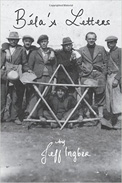
 |
The author has created a captivating work of historical fiction based on stories told by his surviving parents and relatives, and inspired by the packet of letters his father, Béla Ingber, carried when he fled his native Hungary. Béla was the fourth son of eight children born to Kalman and Eszter Ingber. This loving Jewish family lived in Munkacs, Hungary. Béla was in his 20s when Hitler began to implement his plan for a master race. The oldest son, Jeno, worked for a newspaper and warned of what was happening in Germany. Zionists urged Jews to flee to Palestine before persecution arrived in Hungary. Béla could not bring himself to leave his parents, until he and brother, Ferencz, were conscripted for the Hungarian army.
One day, all Jewish men were told to lay down their weapons and were forced to repair buildings, roads, and dig trenches. The stories had been true! Ferencz's unit was sent to the Russian front where he died. Béla's unit remained near Hungary, where he outlasted hunger, winters, and hateful commanders. In 1944, family members at Munkacs were transported to German prison camps. Eventually, Joska Ingber, the third son, escaped to America, and at the war's end, he worked to bring surviving siblings to New York.
When horrible events and secret guilt are uncovered in the book, the reader may become overwhelmed as Béla and his siblings weep tears of pain and of joy. Two unspoken questions remain: Could history repeat itself? And if so, how would people react? The Preface inspired by the woman who translated Béla's Letters provides a warm touch. Granted, reversing the Preface and Acknowledgements sections, would have made for a less dramatic story. Regardless, the author should have known to notify readers up front of literary license taken by introducing fictional characters, conversations, and letters based on his considerable research. A family tree, photos, and selected timeline serve to tie the 564-page Ingber story to historic events.